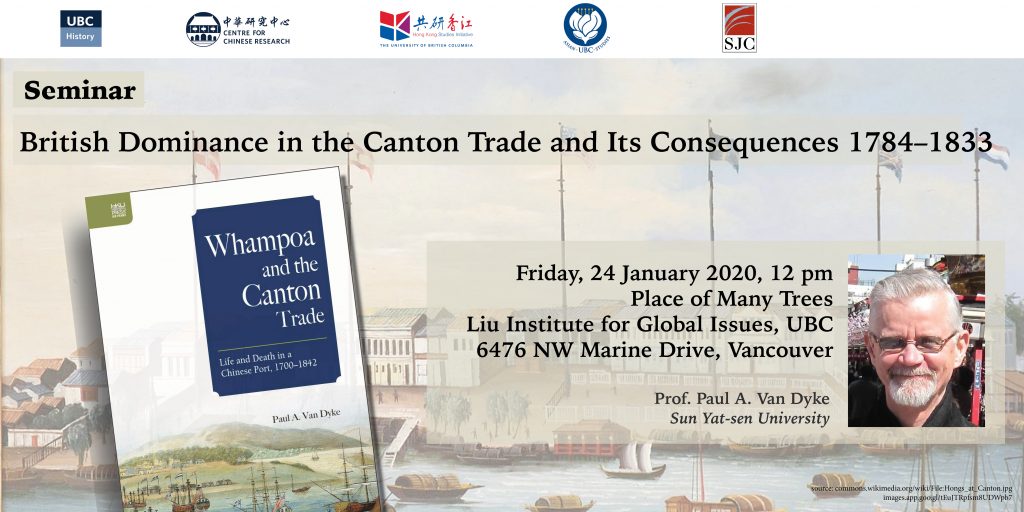Seminar
Friday, 24 January 2020, 12 pm
British Dominance in the Canton Trade and Its Consequences, 1784–1833
Prof. Paul A. Van Dyke (Sun Yat-sen University)
Place of Many Trees, Liu Institute for Global Issues, UBC
6476 NW Marine Drive, Vancouver
As is well-known, Great Britain played a prominent role in the Canton trade from its beginnings in the early eighteenth century to the end of the British East India Company’s (EIC) voyages to China in 1833. Other Europeans and private traders from India, Southeast Asia, the Americas, and elsewhere played significant roles as well, but in the late eighteenth century some of those players began to withdraw from the trade. New data shows that 1784 was a watershed year when foreign competition within the trade began to decline. This was not the outcome that Qing officials expected or wanted, but it was the reality they had to deal with. There was enormous pressure on Customs Superintendents (Hoppos) and governor generals to maintain trade revenues, which meant they needed to accommodate their number one player, the EIC, while at the same time, keep the British from controlling the commerce. They were only partially successful. Hong merchants rose and fell according to British desires; British captains attacked enemy ships and showed aggression towards their adversaries in China despite Qing officials’ protests; and British warships attempted to annex Macao. Several Hong merchants tried to retire from the trade from 1804 to 1808, to escape becoming puppets of the EIC and new restrictive measures were introduced to limit the company’s influence. It is well-known that corruption and mismanagement weakened the Canton system from within, but less understood how British dominance and the inability of the Qing administration to maintain a competitive environment, contributed to its demise.
Paul A. Van Dyke is professor of history at Sun Yat-sen University, Guangzhou. He has authored several books on the history of the foreign trade in Guangzhou, including The Canton Trade (2005), two volumes of Merchants of Canton and Macao (2011 and 2016), and is co-author of Images of the Canton Factories (2015). He is co-translator and annotator of three volumes of The Canton-Macao Dagregisters 1762, 1763, 1764 (published in 2006, 2008, and 2009, respectfully) and has published numerous articles about the China trade, maritime exchanges in Asia, and East-West interactions. This present study introduces arguments from his new book entitled Whampoa and the Canton Trade: Life and Death in a Chinese Port, which will be published by Hong Kong University Press in April 2020
This seminar is co-sponsored by the Department of History, the Centre for Chinese Research, the Hong Kong Studies Initiative, the Department of Asian Studies, and St. John’s College.
